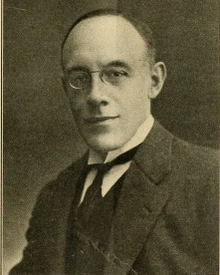Auckland Campbell Geddes, 1st Baron Geddes
|
The Right Honourable The Lord Geddes GCMG, KCB, PC |
|
|---|---|
 |
|
| President of the Board of Trade | |
|
In office 26 May 1919 – 19 March 1920 |
|
| Monarch | George V |
| Prime Minister | David Lloyd George |
| Preceded by | Sir Albert Stanley |
| Succeeded by | Robert Horne |
| British Ambassador to the United States | |
|
In office 1920–1924 |
|
| Monarch | George V |
| President |
Woodrow Wilson Warren G. Harding Calvin Coolidge |
| Prime Minister |
David Lloyd George Bonar Law Stanley Baldwin Ramsay MacDonald |
| Preceded by | The Viscount Grey of Fallodon |
| Succeeded by | Sir Esme Howard |
| Personal details | |
| Born | 21 June 1879 |
| Died | 8 June 1954 (aged 74) |
| Nationality | British |
| Political party | Conservative |
| Spouse(s) | Isabella Ross |
Auckland Campbell Geddes, 1st Baron Geddes, GCMG, KCB, PC, FRSE (21 June 1879 – 8 June 1954) was a British academic, soldier, politician and diplomat. He was a member of David Lloyd George's coalition government during the First World War and also served as Ambassador to the United States.
Geddes was born in London the son of Auckland Campbell-Geddes, a civil engineer, and his wife Christina Helen MacLeod Anderson. He was the brother of Sir Eric Campbell-Geddes, First Lord of the Admiralty during World War I and principal architect of the Geddes Axe, which led to the retrenchment of British public expenditure following the War.
Geddes served in the Second Boer War between 1901 and 1902 as a second lieutenant in the Highland Light Infantry. On 2 June 1902 he was promoted a lieutenant in the 3rd (Militia) Battalion of the regiment. During the First World War he served as a Major in the 17th Northumberland Fusiliers and was on the staff of the General Headquarters in France as a Brevet Lieutenant-Colonel and Honorary Brigadier General. Geddes was Director of Recruiting at the War Office from 1916 to 1917.
...
Wikipedia
